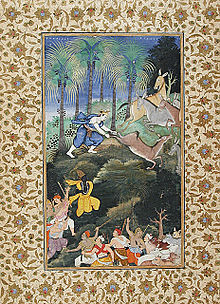
Shesha, also known by his epithets Sheshanaga and Adishesha, is a serpentine demigod (naga) and king of the serpents (Nagaraja), as well as a primordial being of creation in Hinduism. In the Puranas, Shesha is said to hold all the planets of the universe on his hoods and to constantly sing the glories of Vishnu from all his mouths. He is sometimes referred to as Ananta Shesha.

Balarama is a Hindu god, and the elder brother of Krishna. He is particularly significant in the Jagannath tradition, as one of the triad deities. He is also known as Haladhara, Halayudha, Baladeva, Balabhadra, and Sankarshana.

The Hare Krishna mantra, also referred to reverentially as the Mahā-mantra, is a 16-word Vaishnava mantra mentioned in the Kali-Saṇṭāraṇa Upaniṣad. In the 15th century, it rose to importance in the Bhakti movement following the teachings of Chaitanya Mahaprabhu. This mantra is composed of three Sanskrit names – "Krishna", "Rama", and "Hare".
In Hinduism, Itihasa-Purana, also called the fifth Veda, refers to the traditional accounts of cosmogeny, myths, royal genealogies of the lunar dynasty and solar dynasty, and legendary past events, as narrated in the Itihasa and the Puranas. They are highly influential in Indian culture, and many classical Indian poets derive the plots of their poetry and drama from the Itihasa. The Epic-Puranic chronology derived from the Itihasa-Puranais an influential frame of reference in traditional Indian thought.

In Hindu scriptures, Durvasa, also known as Durvasas, is a legendary rishi (sage). He is the son of Anasuya and Atri. According to some Puranas, Durvasa is a partial avatar of Shiva, known for his short temper. Wherever he goes, he is received with great reverence by humans and devas alike.
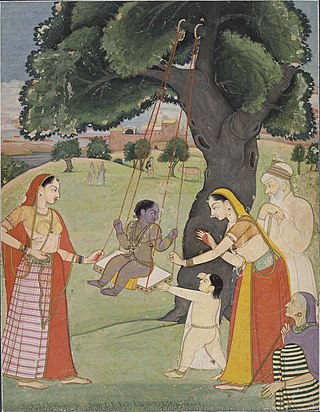
Nanda is a cow-herd chief, and the foster-father of Krishna, featured in the Harivamsha and the Puranas. Nanda is the son of Parjanya, a ruler of the Vraja region, who is a son of the Yadava king, Devamidha. He is the chief of Gokulam, which is one of the most powerful territories of the Yadava tribe. He is sometimes referred to as a king.

Kamsa was the tyrant ruler of the Vrishni kingdom, with its capital at Mathura. He is variously described in Hindu literature as either a human or an asura; The Puranas describe him as an asura, while the Harivamśa describes him as an asura reborn in the body of a man. His royal house was called Bhoja; thus, another of his names was Bhojapati. He was the cousin of Devaki, the mother of the deity Krishna; Krishna ultimately fulfilled a prophecy by slaying Kamsa.
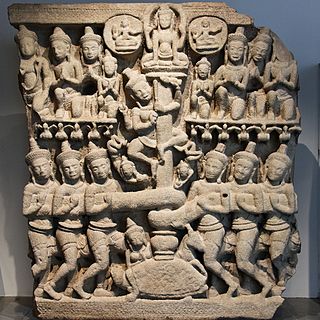
Hindu mythological wars are the wars described in the Hindu texts of ancient India. These wars depicted both mortals of great prowess as well as deities and supernatural beings, often wielding supernatural weapons of great power. Hindu teachings prescribe war as the final option, to be employed only after all peaceful methods are exhausted. Participation in righteous war, or dharmayuddha, was said to be honourable and was a principal duty of the Kshatriya or the warrior varna, and victory in such wars was regarded as a matter of honour.

Satyabhama, also known as Satrajiti, is a Hindu goddess and the third queen consort of the Hindu god Krishna. Satyabhama is described as an incarnation of Bhumi, an aspect of Lakshmi. She is the goddess and the personification of the Earth. She has two sisters named Vratini and Prasvapini who are her co-wives as well. According to some traditions, she is regarded to have aided Krishna in defeating the asura Narakasura.
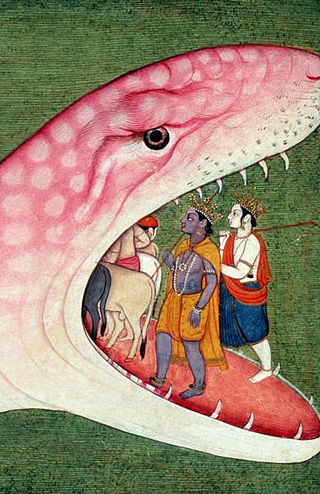
Aghasura is an asura featured in Hindu literature, most notably in the Bhagavata Purana. He was one of Kamsa's generals, and the elder brother of the demoness Putana and Bakasura.
Pralamba is an asura killed by Balarama in Hindu mythology. According to the pertinent legend, the asura assumed the guise of a cowherd and attempted to join Krishna and Balarama in a game of jumping, whose conditions dictated that the loser carry the victor on his back. Pralamba promptly lost, and was forced to carry Balarama on his back. However, Pralamba then transformed himself into a larger form and tried to run off with Balarama still clinging to him, which would have happened had Krishna not stopped him with a speech reprimanding him and asking him to suspend his powers. Balarama then clung to Pralamba, squeezing him with his knees, striking him simultaneously on the head and face with his fists, assaulting both his eyes. The asura, vomiting blood from his mouth, and having his brain bashed through the skull, descended to the earth and was slain. References to Pralamba are available in the Vishnu Purana and the Mahabharata.
Dvivida is the name of various monkey-like characters featured in Hinduism.

The Syamantaka is a legendary jewel featured in Hindu literature, regarded to be blessed with magical powers. It is described to be a ruby. The jewel is described to protect its owner if they were virtuous and good, but bring evil to them if they were not.

The Dashavatara are the ten primary avatars of Vishnu, a principal Hindu god. Vishnu is said to descend in the form of an avatar to restore cosmic order. The word Dashavatara derives from daśa, meaning "ten", and avatāra, roughly equivalent to "incarnation".

Sharanga also spelt as Saranga, is the celestial bow of the Hindu god Vishnu, primarily associated with his avatar of Rama. In South India, the Sharanga is also simply known as the Kodanda, literally meaning bow. Rama is often praised as Kodandapani, the holder of the Kodanda. The attribute of the bow is also mentioned in the Vishnu Sahasranama.
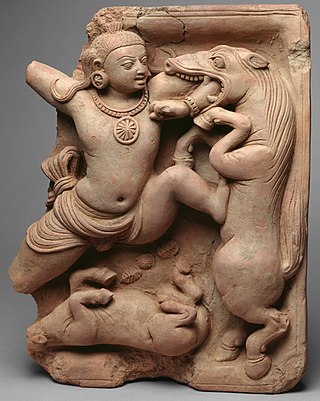
In Hindu mythology, Keshin, also called Keshi is a horse-demon, killed by Krishna, an Avatara of Vishnu. The demon was dispatched by Krishna's evil uncle Kamsa, who was destined to die at Krishna's hands.

Yogamaya is a Hindu goddess who serves as the personification of Vishnu's powers of illusion. In Vaishnava tradition, she is accorded the epithet Narayani—"the sister of Narayana (Vishnu)"—and is regarded as the benevolent aspect of the goddess Durga.

Kalanemi is an asura in Hindu mythology. He is the son of Virochana, and the grandson of Prahlada. He is slain by Vishnu in the Tarakamaya War, in which he is described to be a commander. In one of his rebirths, in various traditions, he is born as Kamsa, the son of Ugrasena, and becomes the king of Mathura. His nephew, Krishna, an avatar of Vishnu, slays him for his tyranny. Kalanemi's daughter, Vrinda, becomes Jalandhara's wife.

In Hindu cosmology, the Karanodaka or the Garbhodaka, also referred to as the Causal Ocean, is the origin of material creation. It is the place in the spiritual sky where Mahavishnu lies down and creates the material world. The Causal Ocean is the border between the spiritual and material worlds.
